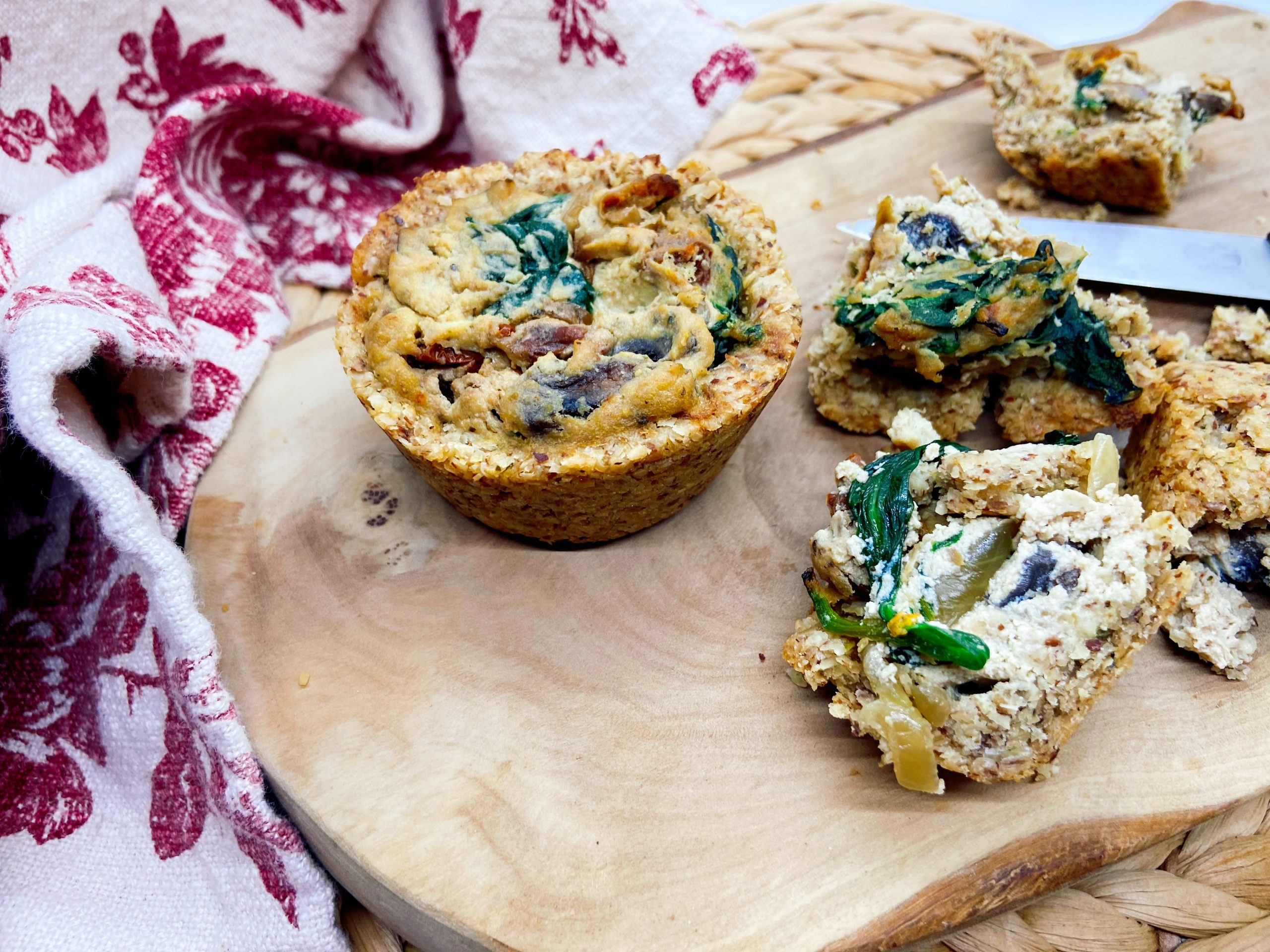Vegan Breakfast Quiche
Breakfast can be chaotic, even without a newborn in the mix. At Nourish, we make sure that your first meal of the day is packed with all the nutrients you need to start your day on the right foot without having to think about it. Keep reading for the Vegan Breakfast Quiche nutritional informations, storage and reheating instructions.
This breakfast item must be store in the refrigerator and eaten warm or room temperature.
Reheat in a conventional oven at 350F for 10/15 minutes or microwave for 1 minute and 30 seconds.
Vegan Breakfast Quiche Ingredient List :
Crust : flax, almond flour, oat flour, oregano, EVOO, coconut oil, salt, water
Filling : tofu, onion, garlic, button mushrooms, chives, sun-dried tomatoes, spinach, nutritional yeast, oregano, coconut oil, sea salt, black pepper
Contact us if you have any questions.
About the Vegan Breakfast Quiche Ingredients
Flax :
- Omega-3 essential fatty acids, “good” fats that have been shown to have heart-healthy effects. Each tablespoon of ground flaxseed contains about 1.8 grams of plant omega-3s.
- Lignans, which have both plant estrogen and antioxidant qualities. Flaxseed contains 75 to 800 times more lignans than other plant foods.
- Fiber. Flaxseed contains both the soluble and insoluble types.
Oats :
Oats are rich in carbs and fiber, but also higher in protein and fat than most other grains.
They are very high in many vitamins and minerals (for 1/2 cup or 78g of oats) :
- Manganese: 191% of the RDI
- Phosphorus: 41% of the RDI
- Magnesium: 34% of the RDI
- Copper: 24% of the RDI
- Iron: 20% of the RDI
- Zinc: 20% of the RDI
- Folate: 11% of the RDI
- Vitamin B1 (thiamin): 39% of the RDI
- Vitamin B5 (pantothenic acid): 10% of the RDI
- Smaller amounts of calcium, potassium, vitamin B6 (pyridoxine) and vitamin B3 (niacin)
Almonds :
Almonds boast an impressive nutrient profile. A 1-ounce (28-gram) serving of almonds contains :
- Fiber: 3.5 grams
- Protein: 6 grams
- Fat: 14 grams (9 of which are monounsaturated)
- Vitamin E: 37% of the RDI
- Manganese: 32% of the RDI
- Magnesium: 20% of the RDI
Almonds are high in antioxidants that can protect your cells from oxidative damage, a major contributor to aging and disease.
They are among the world’s best sources of vitamin E, with just 1 ounce providing 37% of the RDI.
These amazing tree nuts are extremely high in magnesium, a mineral that many people don’t get enough of. High magnesium intake may offer major improvements for metabolic syndrome and type 2 diabetes. Magnesium is a mineral involved in more than 300 bodily processes, including blood sugar control.
“Bad” LDL cholesterol can become oxidized, which is a crucial step in the development of heart disease. Snacking on almonds has been shown to significantly reduce oxidized LDL.
Tofu :
Tofu is high in protein and contains all of the essential amino acids your body needs. It also provides fats, carbs, and a wide variety of vitamins and minerals.
One 3.5-ounce (100-gram) serving of tofu offers :
- Protein: 8 grams
- Carbs: 2 grams
- Fiber: 1 gram
- Fat: 4 grams
- Manganese: 31% of the RDI
- Calcium: 20% of the RDI
- Selenium: 14% of the RDI
- Phosphorus: 12% of the RDI
- Copper: 11% of the RDI
- Magnesium: 9% of the RDI
- Iron: 9% of the RDI
- Zinc: 6% of the RDI
This comes with only 70 total calories, which makes tofu a highly nutrient-dense food.
Nutritional yeast :
Nutritional yeast is a great source of protein, B vitamins and trace minerals.
Some of the main nutritional benefits of nutritional yeast include:
- It is a complete protein: Nutritional yeast contains all nine essential amino acids that humans must get from food. One tablespoon contains 2 grams of protein, making it an easy way for vegans to add high-quality protein to meals.
- It contains many B vitamins: One tablespoon of nutritional yeast contains 30–180% of the RDI for B vitamins. When fortified, it is especially rich in thiamine, riboflavin, niacin, vitamin B6 and vitamin B12.
- It contains trace minerals: One tablespoon contains 2–30% of the RDI for trace minerals, such as zinc, selenium, manganese and molybdenum. Trace minerals are involved in gene regulation, metabolism, growth and immunity.
Fortified nutritional yeast contains high amounts of vitamin B12 and can be used to help prevent deficiency.
IT contains the antioxidants glutathione and selenomethionine, both of which can help protect your body from chronic diseases caused by oxidative stress.
Fresh vegetables :
A diet rich in vegetables and fruits can lower blood pressure, reduce the risk of heart disease and stroke, prevent some types of cancer, lower risk of eye and digestive problems, and have a positive effect upon blood sugar, which can help keep appetite in check.


Leave a Reply